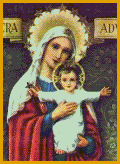 |
Tracts
Our Lady of the Atonement Catholic Church |
..
|
Saint Joseph: A Man of Justice, A Man of Kindness
In all of Jerusalem there is no basilica, there is no cathedral, there is no church built to honor Saint Joseph. In that Holy City, so abundantly overflowing with monuments and memories of our Catholic faith, and where the Church received its first breath of life from our Blessed Savior, there is no majestic shrine as a place of devotion to the Universal Patron of that Church. The only remembrance of the foster-father of Jesus in all of Jerusalem is a small altar built into the side of the stairway which descends to the site of the Assumption of the Blessed Virgin Mary. It is most unimposing, hidden in a dark chapel with room for no more than a few people, and it would be missed by most pilgrims if it were not pointed out to them. "How strange," one might think. "How strange that in the city which saw so much of the saving work of the Incarnate Word, there is nothing more than this to remember the Protector of that Word." It is strange, and yet it seems somehow suitable. It is as though this would be what Saint Joseph would want. The Guardian of our Lord had lived obediently and he had died quietly. Never once during his lifetime did he overshadow the Divine Child who was called his son, or the pure maiden who had been his wife, and there certainly would be no desire to do so after his death.
Very little is known concerning Joseph, and yet enough is known to reveal what his character was. All that we know of him, we know from the Gospels, and it is there that we see him to be a man who was determined to do what is right in the sight of God, and to do it in a kindly way. He was betrothed to Mary, and according to Jewish practice, betrothal was as sacred as marriage. Because of that, any infidelity before the actual marriage were treated in the same way as infidelity after marriage: death by stoning was the punishment for such sins. By all human appearance, Joseph's beloved betrothed was in just such circumstances, and he had to act in the way that seemed best. Certainly, he was a just man, but he was a kind man, too, and surely what Mary told him made a great demand on his faith. But that is the point: Joseph was, above all, a man of faith and completely obedient to the divine will of Almighty God. When it was revealed to him that Mary was to bear the Incarnate Son of God he took her to be his wife. There was no hesitation, no consider-ation of what others might think or how they might judge. It mattered little to him that it was assumed he was the human father of this Child -- not that he would have encouraged others to believe such a thing, for he knew the truth -- but it was better than having people think that Mary had shamefully conceived with someone else, and so Joseph took the responsibility, knowing that one day the truth would be known, and that Truth "would make men free." It is in this very situation, brought about by God Himself, that Saint Joseph's justness and kindness are both revealed.
His justness is shown in that he was a devout servant of God, and he ordered his life according to the standard of that law which had been revealed to the Jewish nation. He sought to please God in all things, even when it meant that he would be misunderstood or even harshly judged by the world. And because justness does not exclude kindness, his response to the revelation that Mary had conceived by the Holy Spirit was one of deep gladness and joy, and so he took his place in God's plan without fear or hesitation. This place was not one of glory; rather, it was one of quiet reserve. Whether on the way to Bethlehem, or in the stable, or at the Child's circumcision on the eighth day, or in the Temple when He was presented, or in everyday life in Nazareth, Joseph simply was there. Loved and respected both by the Incarnate Son of God and by the Mother of God, he was a man of deep piety and gracious character.
Within Saint Paul's Cathedral in London is the tomb of its architect, and on that tomb are the words, "If ye seek his monument, look around you." How much more impressive are those words when they are used of Saint Joseph, Patron of the Universal Church. There could be no greater remembrance of Joseph's holy life, than that glorious Church founded by the Lord Jesus Christ, the foster-son of the quiet, just, kind man of God.
Saint Joseph, pray for us; and through your prayers may God give each of us even a portion of the goodness which has been revealed in you.
| Our Lady of the Atonement Catholic Church | More Tracts |